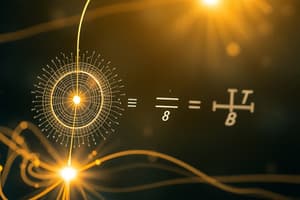Podcast
Questions and Answers
What is the mathematical operation that describes the rate of change of a scalar field with respect to position?
What is the mathematical operation that describes the rate of change of a scalar field with respect to position?
- Laplacian
- Gradient (correct)
- Curl
- Divergence
Which of Maxwell's equations relates the electric field around a closed loop to the changing magnetic flux through the loop?
Which of Maxwell's equations relates the electric field around a closed loop to the changing magnetic flux through the loop?
- Gauss's law for electric field
- Faraday's law of induction (correct)
- Gauss's law for magnetic field
- Ampere's law with Maxwell's correction
What is the term for the circulation of a vector field around a closed curve?
What is the term for the circulation of a vector field around a closed curve?
- Divergence
- Gradient
- Laplacian
- Curl (correct)
Which of the following laws describes the relationship between the magnetic field and the electric current producing it in a static field?
Which of the following laws describes the relationship between the magnetic field and the electric current producing it in a static field?
What is the term for the rate of change of a vector field with respect to position?
What is the term for the rate of change of a vector field with respect to position?
Flashcards are hidden until you start studying
Study Notes
Fields
- A scalar field is a function that assigns a numerical value to each point in space.
- A vector field is a function that assigns a vector to each point in space.
Vector Calculus Operations
- Gradient of a scalar field: a vector field that points in the direction of the maximum rate of increase of the scalar field.
- Divergence of a vector field: a scalar field that describes the rate of flux of the vector field.
- Curl of a vector field: a vector field that describes the rotation of the original vector field.
Maxwell's Equations
- Maxwell's First Equation (Gauss's Law for Electric Field): ∇ ⋅ E = ρ/ε₀, relates electric flux to charge distribution.
- Maxwell's Second Equation (Gauss's Law for Magnetic Field): ∇ ⋅ B = 0, states that magnetic charges do not exist.
- Maxwell's Third Equation (Faraday's Law of Induction): ∇ × E = -∂B/∂t, describes how changing magnetic fields induce electric fields.
- Maxwell's Fourth Equation (Ampere's Law with Maxwell's Correction): ∇ × B = μ₀J + μ₀ε₀∂E/∂t, relates magnetic fields to electric currents and displacement currents.
Electromagnetic Induction
- Electrostatics: the study of stationary electric charges and their effects.
- Magnetostatics: the study of stationary magnetic fields and their effects.
- Faraday's Law of Induction: describes how changing magnetic flux induces electric fields.
- Ampere's Law: relates magnetic fields to electric currents in static fields.
- Ampere's Law in Time-Varying Fields: includes the effect of displacement currents in time-varying fields.
Studying That Suits You
Use AI to generate personalized quizzes and flashcards to suit your learning preferences.




